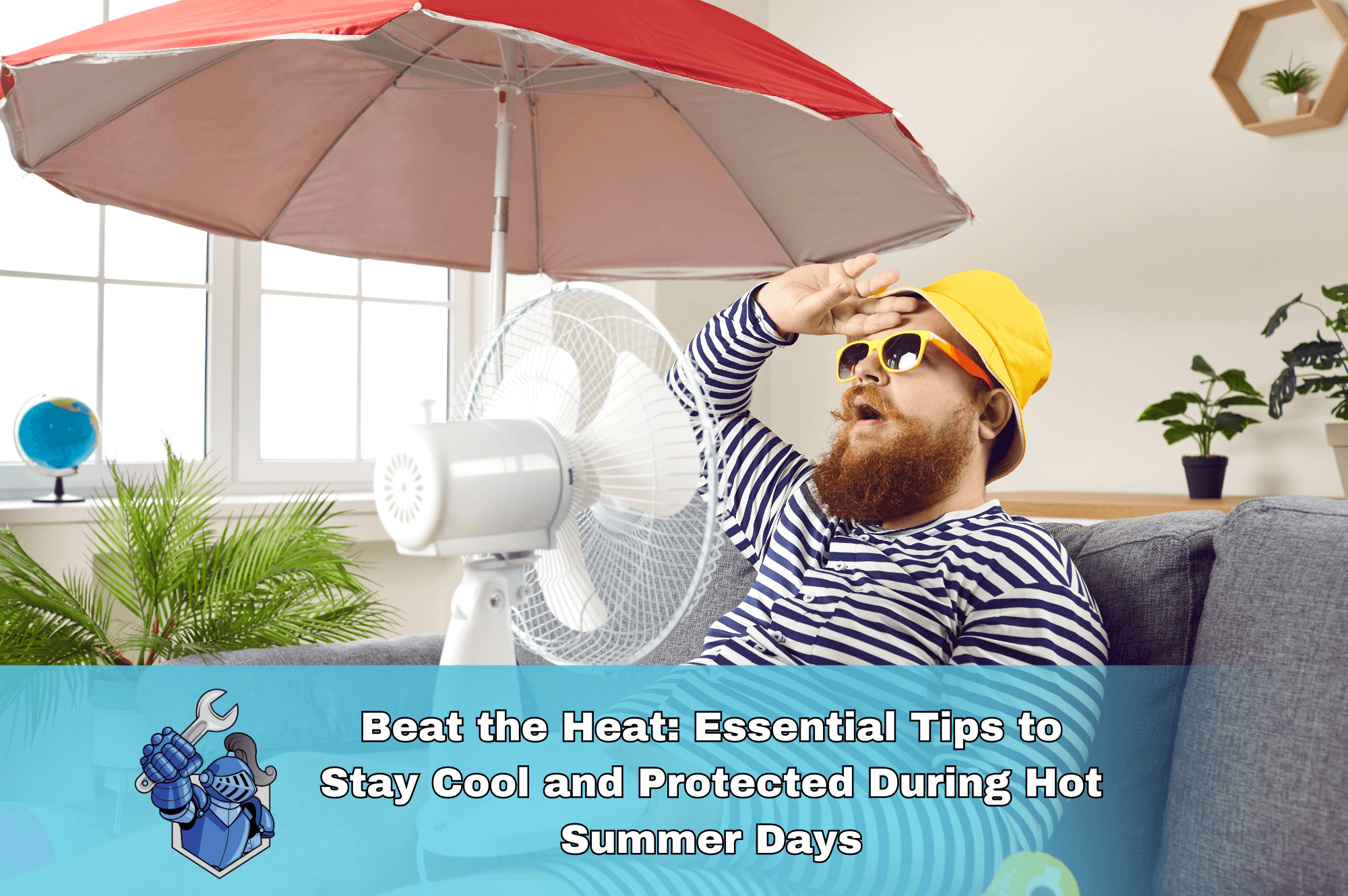As the summer sun blazes, it's crucial to be prepared for extremely hot days. Whether you're spending time outdoors, commuting, or simply staying at home, understanding how to beat the heat can make all the difference in ensuring the well-being of you and your family. In this comprehensive guide, we'll explore best practices for staying cool, safe, and hydrated during the hottest days of the year. We'll also provide practical examples and link to valuable resources for further information.
Understanding the Risks of Extreme Heat
Extreme heat is not just uncomfortable; it can also pose significant health risks. Heat-related illnesses such as heat exhaustion, heat stroke, and dehydration are serious conditions that can have severe consequences if not addressed promptly. Vulnerable populations, including young children, the elderly, and those with chronic illnesses, are particularly at risk.
Best Practices for Staying Cool
1. Stay Hydrated
Dehydration is a major concern during hot weather. Here are some tips to ensure you and your family stay properly hydrated:
- Drink Plenty of Water: Aim to drink at least 8-10 glasses of water a day. Increase this amount if you're spending time outdoors or engaging in physical activities.
- Avoid Sugary and Caffeinated Beverages: Drinks like soda and coffee can contribute to dehydration. Opt for water, herbal teas, or electrolyte-rich sports drinks instead.
- Eat Water-Rich Foods: Incorporate fruits and vegetables with high water content, such as watermelon, cucumbers, and oranges, into your diet.
2. Dress Appropriately
Choosing the right clothing can significantly impact your comfort level in extreme heat:
- Wear Light-Colored, Loose-Fitting Clothes: Light colors reflect sunlight, while loose-fitting clothes allow air circulation, helping to keep your body cool.
- Opt for Breathable Fabrics: Natural fabrics like cotton and linen are more breathable than synthetic materials, allowing sweat to evaporate more easily.
- Use Hats and Sunglasses: Protect your face and eyes from the sun with wide-brimmed hats and UV-protective sunglasses.
3. Create a Cool Environment
Keeping your living space cool is essential for maintaining comfort and preventing heat-related illnesses:
- Use Air Conditioning: If you have air conditioning, use it to maintain a comfortable indoor temperature. Ensure your unit is serviced regularly for optimal performance.
- Utilize Fans and Ventilation: Fans can help circulate air, while open windows in the early morning or late evening can allow cooler air to flow through your home.
- Block Out Sunlight: Use blackout curtains or shades to block out the sun during the hottest parts of the day, reducing indoor temperatures.
4. Limit Outdoor Activities
During peak heat hours, typically between 10 a.m. and 4 p.m., it's best to stay indoors:
- Plan Outdoor Activities Wisely: If you must be outside, schedule activities for early morning or late evening when temperatures are cooler.
- Take Frequent Breaks: If working or playing outside, take regular breaks in the shade or indoors to cool down.
- Use Sunscreen: Apply a broad-spectrum sunscreen with at least SPF 30 to protect your skin from harmful UV rays.
Protecting Vulnerable Family Members
1. Young Children
Children are more susceptible to heat-related illnesses due to their smaller body size and higher metabolic rates:
- Never Leave Children in Cars: Even with windows cracked, temperatures inside a car can rise rapidly, leading to potentially fatal heatstroke.
- Keep Kids Hydrated: Encourage children to drink water regularly, especially when playing outside.
- Dress Kids Appropriately: Lightweight, loose-fitting clothes and wide-brimmed hats can help keep children cool.
2. Elderly Individuals
Older adults may have difficulty regulating their body temperature and are at higher risk for heat-related illnesses:
- Check on Elderly Relatives and Neighbors: Ensure they have access to air conditioning or cooling centers and are staying hydrated.
- Encourage Hydration: Remind elderly family members to drink water regularly, even if they don't feel thirsty.
- Help with Transportation: Offer to drive elderly relatives to appointments or errands during cooler parts of the day.
3. Pets
Pets also need protection from the heat:
- Provide Plenty of Water: Ensure pets have access to fresh, cool water at all times.
- Keep Pets Indoors: During extreme heat, keep pets indoors where it's cooler.
- Never Leave Pets in Cars: Like children, pets can suffer from heatstroke if left in a hot car.
Additional Tips for Beating the Heat
1. Cool Showers and Baths
Taking a cool shower or bath can help lower your body temperature quickly. This is especially helpful if you've been outside or are feeling overheated.
2. Use Cooling Products
Consider using cooling towels, ice packs, or portable fans to help keep your body temperature down. These products can provide immediate relief from the heat.
3. Stay Informed
Keep an eye on weather forecasts and heat advisories. Knowing when extreme heat is expected can help you plan accordingly and take necessary precautions.
Practical Examples and Case Studies
Example 1: The Smith Family's Heat Wave Plan
The Smith family implemented a comprehensive plan to stay cool during a recent heat wave. They installed blackout curtains in their home, used fans strategically, and ensured everyone drank plenty of water. They also planned family activities for early mornings and late evenings, avoiding the hottest parts of the day. By taking these steps, the Smith family managed to stay comfortable and safe throughout the heat wave.
Example 2: Elderly Care During Hot Days
Mrs. Johnson, an elderly woman living alone, received regular check-ins from her neighbors during a heat wave. They helped her access a local cooling center and ensured she stayed hydrated. Their support was crucial in helping Mrs. Johnson avoid heat-related illnesses.
Resources for Further Information
For more detailed information on staying safe during extreme heat, visit the following resources:
For additional tips and resources, be sure to check out our Learning Center at NobleQuote Learning Center.
Conclusion
Staying prepared for extremely hot days is essential for the health and safety of you and your family. By following the best practices outlined in this guide—staying hydrated, dressing appropriately, creating a cool environment, and protecting vulnerable family members—you can beat the heat and enjoy the summer safely. Remember to stay informed, take necessary precautions, and make the most of the resources available to you. Stay cool and stay safe!
Frequently Asked Questions (FAQ)
1. What are the signs of heat-related illnesses, and how can I recognize them?
Heat-related illnesses can range from mild conditions like heat cramps to more severe ones like heat exhaustion and heat stroke. Common signs to watch for include:
- Heat Cramps: Muscle spasms, usually in the legs or abdomen.
- Heat Exhaustion: Heavy sweating, weakness, cold, pale and clammy skin, fast and weak pulse, nausea, or vomiting.
- Heat Stroke: High body temperature (above 103°F), hot, red, dry or damp skin, rapid and strong pulse, confusion, or unconsciousness.
If you notice any of these symptoms, it's crucial to take immediate action by moving to a cooler place, drinking water, and seeking medical attention if necessary.
2. How can I keep my home cool without air conditioning?
If you don't have air conditioning, there are several ways to keep your home cool:
- Use fans strategically: Place fans near windows to create cross-ventilation.
- Block out the sun: Use blackout curtains or shades to keep the sun's heat out during the day.
- Cool your body: Take cool showers, use cold compresses, and wear light, breathable clothing.
- Stay on lower levels: Heat rises, so the lower levels of your home may be cooler.
3. What should I do if I have to be outside during peak heat hours?
If you must be outside during peak heat hours (10 a.m. to 4 p.m.), follow these tips to stay safe:
- Stay hydrated: Drink plenty of water before, during, and after being outside.
- Take breaks: Find shade or go indoors to cool down frequently.
- Wear appropriate clothing: Light-colored, loose-fitting clothes, a wide-brimmed hat, and sunglasses.
- Use sunscreen: Apply a broad-spectrum sunscreen with at least SPF 30 to protect your skin from UV rays.
4. How can I ensure my children stay safe and cool during hot days?
To keep your children safe and cool during hot days:
- Hydration: Encourage them to drink water regularly.
- Proper clothing: Dress them in light-colored, loose-fitting clothes and wide-brimmed hats.
- Indoor activities: Plan indoor activities during the hottest parts of the day.
- Never leave them in cars: Even for a short period, leaving children in a car can be extremely dangerous.
5. What are some tips for helping elderly family members cope with the heat?
Elderly individuals are more vulnerable to heat-related illnesses. Here are some tips to help them stay cool:
- Check on them frequently: Ensure they have access to air conditioning or cooling centers.
- Encourage hydration: Remind them to drink water regularly, even if they don’t feel thirsty.
- Keep their living space cool: Use fans, close blinds during the day, and ensure they have access to cool places.
- Limit outdoor activities: Help them schedule any necessary outdoor activities for the cooler parts of the day.
Suggestions for you
Read MoreLet’s work together
Every week we showcase three charitable organizations that our donations are sent to. Our clients are able to choose which of these three will receive their gift when they add coverage to their vehicle...




